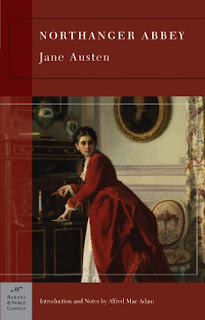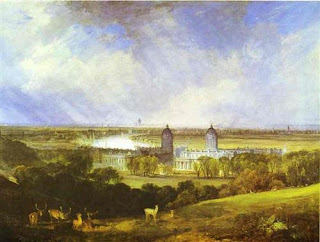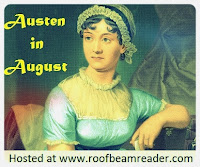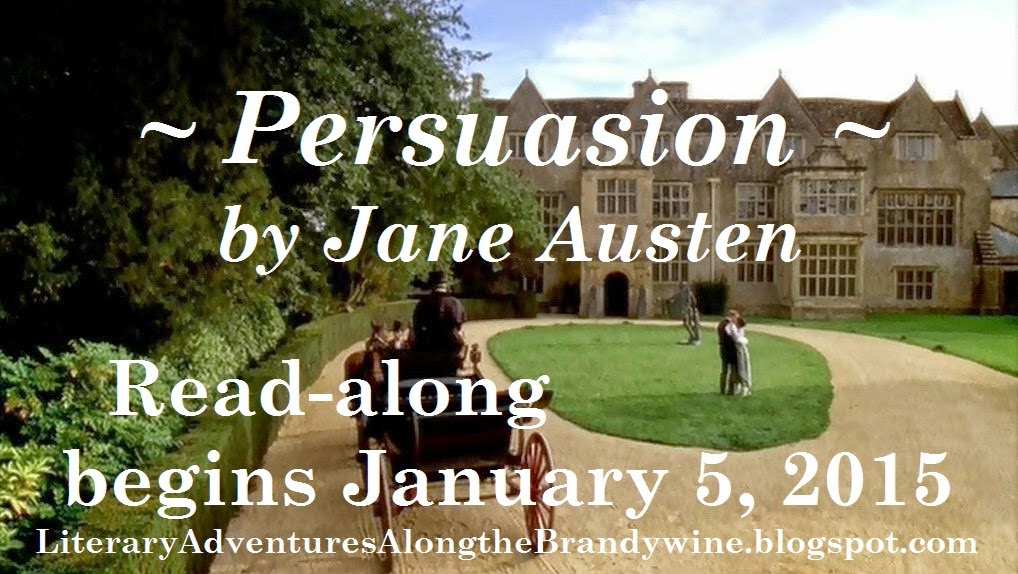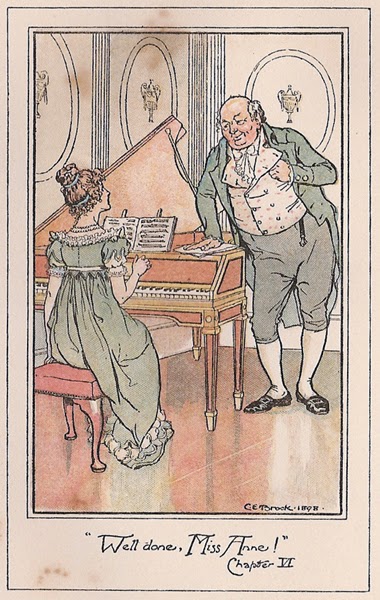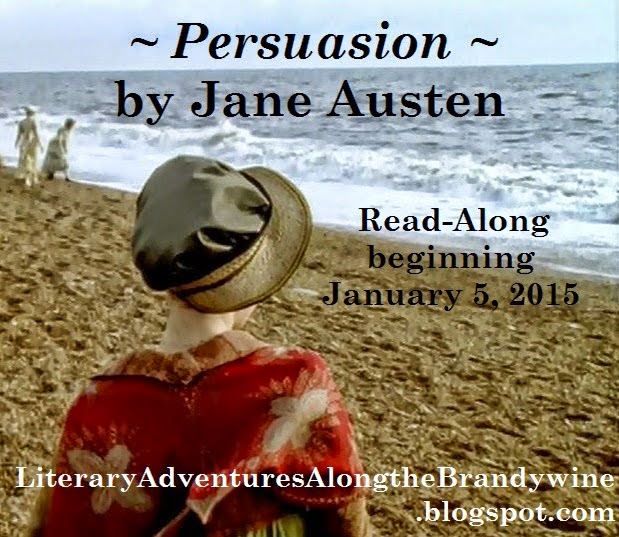“Sir Walter Elliot, of Kellynch-hall, in Somersetshire, was a man who, for his own amusement, never took up any book but the Baronetage; there he found occupation for an idle hours, and consolation in a distressed one ……”
Persuasion was the only major Austen novel that I had not read, so I was thrilled when Heidi at Literary Adventures Along the Brandywine announced her read-along. I wasn’t expecting to enjoy the novel quite as much as Pride and Prejudice, one of my favourites, but I’d heard enough positive reviews to whet my curiousity. And so I plunged in.
Anne Elliot is one of three daughters of Sir Walter Elliot, a vain baronet who is obsessed with the peerage. While her sister, Elizabeth, is somewhat bossy, and Mary proves a proud, yet questionable, invalid, Anne shows a quiet reserve with more than average good sense and judgement. Eight years ago, her engagement to Captain Frederick Wentworth was almost certain, but without a mother for guidance, and influenced by a respected friend of the family, Lady Russell, she broke off the engagement with a deep regret.
 |
Manor House, Somersetshire (Halsway Manor)
source Wikipedia |
Now, eight years later, Anne is confronted with a number of upheavals in her life. Not only does she and her family have to leave their ancestral home, Kellynch-hall, because of reduced finances, but Captain Wentworth has returned, and to further complicate matters, his sister and her husband are the new tenants of Kellynch-hall. The blows would have reduced a weaker woman to despondency, but Anne is not only resourceful, she has learned to suffer life’s troughs with resilience, and her positive attitude brings her through the stormy seas.
Initially, Captain Wentworth is all resentment and cool responses, but gradually, as he sees Anne’s quiet sacrifices, calm demeanour, and strength of character, his acrimony softens towards her. Yet, at the same time, he appears to be playing the eligible bachelor, and it is uncertain as to which woman he will chose to be Mrs. Wenworth. Both of Anne’s sisters-in-law, Henrietta and Louisa, vie for the title and Anne must watch the perceived courtships with an uneasy mind. A near-tragedy causes introspection in more hearts than one, Mr. Eliot, Anne’s cousin and heir to Kellynch, enters the picture to further obscure the matters of courtship, but the final culmination exemplifies that a steadfast love is strengthened by misfortune and time, and the past lovers reunite in a now more matured and seasoned alliance.
 |
| Lyme Regis |
Persuasion is a tale of new beginnings and second chances, not only for Anne and Wentworth, but for the characters surrounding them. Anne’s family, because of their financial straits, must begin a new life in Bath; both the Musgrove girls will be looking forward to the start of their married lives; and even Mrs. Smith, who has found herself in poverty after her husband’s death, is given a second chance at the end of the book as, with help from Wentworth, she recovers money from her husband’s estate that will help her to live more comfortably.
While Austen, as per her usual method, allows the reader to examine certain segments of society, in this book especially, she seems to be highlighting the movements between the social classes, either by marriage or by economic necessity. Within Anne’s family, we not only have the family as a whole dropping in perceived standing by the lack of money to maintain their position at Kellynch, we also have the numerous characters dealing with the descent with different outlooks. Sir Walter is obsessed with his Baronetage book and the importance of his place within the realm of society. At first, he employs denial as to their new position, but thanks to a rather blind self-importance, is able to be persuaded to accept their new situation as if nothing has practically changed. Anne’s sister, Elizabeth, too, acts as if nothing has altered, yet you can see at certain points in the novel that she is aware of the disadvantage of their new situation and that they must have a heightened awareness of appearance to maintain the respect and dignity that they view as a societal necessity. Anne does not seem to be bothered by the family’s reduced circumstances, as position to her comes secondary to character and honesty and integrity. In the old governess, Mrs. Smith we can examine what has come from her rise in stature upon her marriage, and then her subsequent fall upon her husband’s death when she finds herself in financial troubles. Finally, cousin William Elliot falls from his seat of grace with his scandalous behaviour at the end of the novel.
 |
Pulteny Bridge, Bath
18th century
source Wikipedia |
We are given the title of Persuasion for the book, yet Austen did not choose this title; instead her beloved brother, Henry, gave the book its name, as it was published posthumously, and there is no indication of what Austen’s preferred title would have been. Cassandra Austen, Jane’s older sister, reportedly said that a name for this novel had been discussed, and the most likely title was “The Elliots,” but as Austen passed away before selecting a definitive title, no one will know for certain her final choice. Nevertheless the word “persuasion”, or a derivative of it, occurs approximately 30 times in the novel, a good indication that it is one of the main themes. Yet as I finished the novel, what metamorphosed out the “persuasion” was the stronger theme of duty. While Wentworth still appears to be disgruntled by Anne’s choice to follow her family’s wishes in breaking off their engagement eight years before, she however appears to have a different sentiment. At the end of the novel, Anne concludes:
“I have been thinking over the past, and trying impartially to judge of the right and wrong, I mean with regard to myself; and I must believe that I was right, much as I suffered from it, that I was perfectly right in being guided by the friend whom you will love better than you do now. To me, she was in the place of a parent. Do not mistake me, however. I am not sayng that she did not err in her advice. It was, perhaps, one of those cases in which advice is good or bad only as the event decides; and for myself, I certainly never should, in any circumstance of tolerable similarity, give such advice. But I mean, that I was right in submitting to her, and that if I had done otherwise, I should have suffered more in continuing the engagement than I did even in giving it up, because I should have suffered in my conscience. I have now, as far as such a sentiment is allowable in human nature, nothing to reproach myself with; and if I mistake not, a strong sense of duty is no bad part of a woman’s portion.”
In the book Anne is consistently dutiful, to her friend, Mrs. Smith, to her family and, more importantly, to her own conscience; and so we learn that a strong sense of duty and obedience to it is more crucial than any personal inclinations or aspirations.
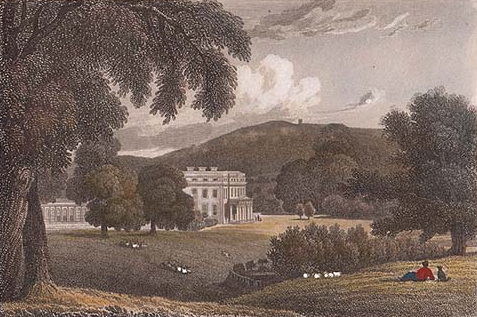 |
Sandhill Park, Somerset (1829)
J.P. Neale/W. Taylor
source Wikipedia |
Persuasion deviates from Austen’s usual style and content. By having a hero without ties to nobility, Austen explores in depth an area of society that had to date been given only a cursory treatment by her. Anne, as an older heroine, is presented in a new way; the reader learns of her character not necessarily through how she actually behaves, but more through her silence and by seeing her in contrast to the intensely flawed people around her. Contrary to other Austen novels, the romance develops almost in isolation, as the characters hold little conversation with each other until the end of the novel. While the novel was interesting for these new features, I felt it to be weaker than Austen’s previous novels, lacking a certain plausibility at times and a solid cohesiveness. As she was writing Persuasion, Austen was ill with the disease that would eventually kill her, and because of this fact, her usual detailed pattern of revision was not completed; in this light, the diminished quality of the novel can certainly be understood. However, while not shining with her usual brilliance, Austen still produced a jewel in its own right, and perhaps more intriguing because of its flaws, as these flaws contribute to its uniqueness. As the character of Anne experiences a new beginning in Persuasion, so does the novel indeed appear to symbolize a new beginning by Austen, this beginning sadly cut short due to her untimely death.
Further reading:

